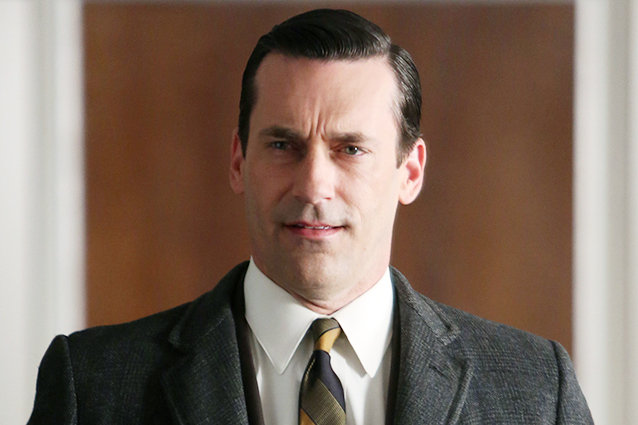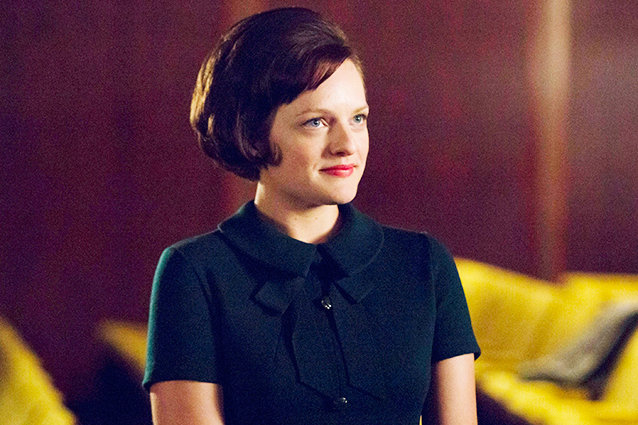
Jaimie Trueblood/AMC
After a pretty erratic year in terms of creative exploration, Mad Men ends
its sixth season on a pretty stellar note. Don't get me wrong — this
week's episode, "In Care Of," is hardly without its flaws. From the
excessive injection of the new Sterling Cooper & Partners logo
throughout the ep's first 10 minutes (could that billing removal be
leading to something for Don?!), to the flashback sequences of which
many of us have grown a bit weary, the season finale treads a little too
on-the-nose in some instances. But serving more as a simple
presentation of what will befall each of the major characters in the
final season than as an actual standalone hour of television, it works.
Because Mad Men seems to know exactly where it needs to take everybody on its team.We'll begin with Pete, who suffers a disaster of a business meeting with Chevy, and the death (or at least maritime disappearance) of his senile mother, presumably at the hands of a gold-digging Manolo. Speaking personally, this latest episode might fork over the most sympathetic view of Pete Campbell we've seen in Mad Men's six years on air. Not for the loss of his mother, but for a scene in which he is pressured by the Chevy representatives, and a manipulative Bob Benson, to take their new stick shift for a spin. My empathies for Pete stem from also being an adult New Yorker who cannot drive a car, much less a stick. My heart goes out to you, Campbell.
But this prideful folly strips Pete of the desired Chevy account and of his residence in Detroit altogether. Almost on a whim, he decides to high tail it to Los Angeles, mirroring the manifest destiny quabbled over by Don and Ted — both of whom are vying for Sunkist's California-based position in hopes of starting anew (Ted escaping his lust for Peggy, Don escaping... well, make a list). As Trudy spells out for Pete, he is "free" of the anchor that was his mother, and his detested family altogether (save for a brother with as little compassion as Pete has). In a way, Pete's real anchor is New York — making his flee to L.A. the most appropriate of the lot. His marital undoing was his zealous love not for other women but for the city, for the need to be in and a part of it. His destruction: the inability to drive (a uniquely New York problem). So, with a maternal stronghold on his psyche no longer, and the self-serving ability to leave his child behind without much of a thought (save for a soft, silent goodbye at the end of the episode), off to Los Angeles Pete goes.
As does Ted, winning the competition in the most unexpected of ways: with Don's blessing. Mere hours after professing his undying love to Peggy and his intention to commit to her, Ted returns home to his wife, realizing that the good man he has always prided himself as being could not conceivably desert his family — the anti-Don indeed. A crumbling Mr. Chaough flies off to Hollywood as Sunkist's local handler, leaving his involvement in next year's story ambiguous. But hey, Pete'll be out there, and we can't exactly be losing him, now can we?

Jessica Brooks/AMC
As the theme of the episode is unequivocally freedom (Ted's from his
love, Pete's from his roots, Don's from his secrets — but we'll get to
that!), Peggy's seems to be from the men in her life, an entirely
appropriate motif, in fact. Peggy entered the series as an entity
representing the limitations for women in the 1960s as upheld by men.
Men, not any men specifically but the very idea of men, were her enemy.
And these same men, generally and specifically, she has
trounced. Peggy's ascension at the end of Season 5 showed her stepping
out of Don's grasp. Since then, we've seen her seek new employ and
return to Sterling Cooper, this time with a new weapon in her arsenal,
Ted Chaough: to reiterate, the anti-Don. A counter for everything Don
can shoot her way. But Ted could only be a vehicle for Peggy, a means to
independence as opposed to a new general to fight under. As the latter
half of the season saw Ted descend into a bubbling puddle, Peggy
gradually bore his arms and took on Don herself. Now, with Ted gone,
Peggy is an independent military. And with Don gone, she exists beyond
the conflict: Peggy, herself, reigns over the nation.And oh yeah, Don's gone. Banished from Sterling Cooper (temporarily, but still) after a shocking display in a sales pitch to Hershey's. Conjuring memories of his own connotation with the chocolate bar company — a kindly hooker in the Whitman family whorehouse used to buy them for young Dick after he'd help her steal money from her clients — Don spills his story. All of it. Brought on by a new, challenging embrace of sobriety (itself inspired by a combination of Don's violent run-in with a minister in a bar, and his daughter Sally's hostile rebellion in experimentation with alcohol), Don faces the fact that the majority of his grief no longer comes from his past. It comes from his secrecy and his lies. In his childhood, Dick was planted inside a rigid fence. In his adulthood, Don reupholsters that fence by the day. But in the face of Ted Chaough, Roger Sterling, Harry Hamlin, and the brilliant men behind Hershey's, Don digs up the planks and decides: No more.
The drinking, the self-drive (in his decision to allow Ted his hospice in L.A.), and the lies are over. His relationship with Megan, as it seems, is over — out of her volition: Don's dismissal of their Hollywood opportunities, in company with his adherence to his family, has driven Megan away at last. Don Draper is over. And Dick Whitman is ushered in, as the ad man takes his three children on a Thanksgiving road trip to see the house, the brothel, in which he grew up. "Here it is, kids," Don says, recalling Sally's admission earlier this season that she doesn't know anything about him. "This is me."
And the marriage of his present with his past is exactly the story Don should be setting forth on in Season 7. The ascension to and beyond Draper's throne is the perfect way to cap Peggy's series-long arc. The seeking of self-worth in something across country? Dynamite stuff, Pete. Roger's new decision to pay devotion to his son Kevin, with Joan's blessing, is also a wonder. If only Joan had a bit more to do this year, we might be more excited for her turn come next season. And if only we knew what at all to expect from Bob Benson, we might begin to wonder how his story will unfold. But for the Big 3, we're thrilled — Mad Men seems to have all its cards in order.
No comments:
Post a Comment